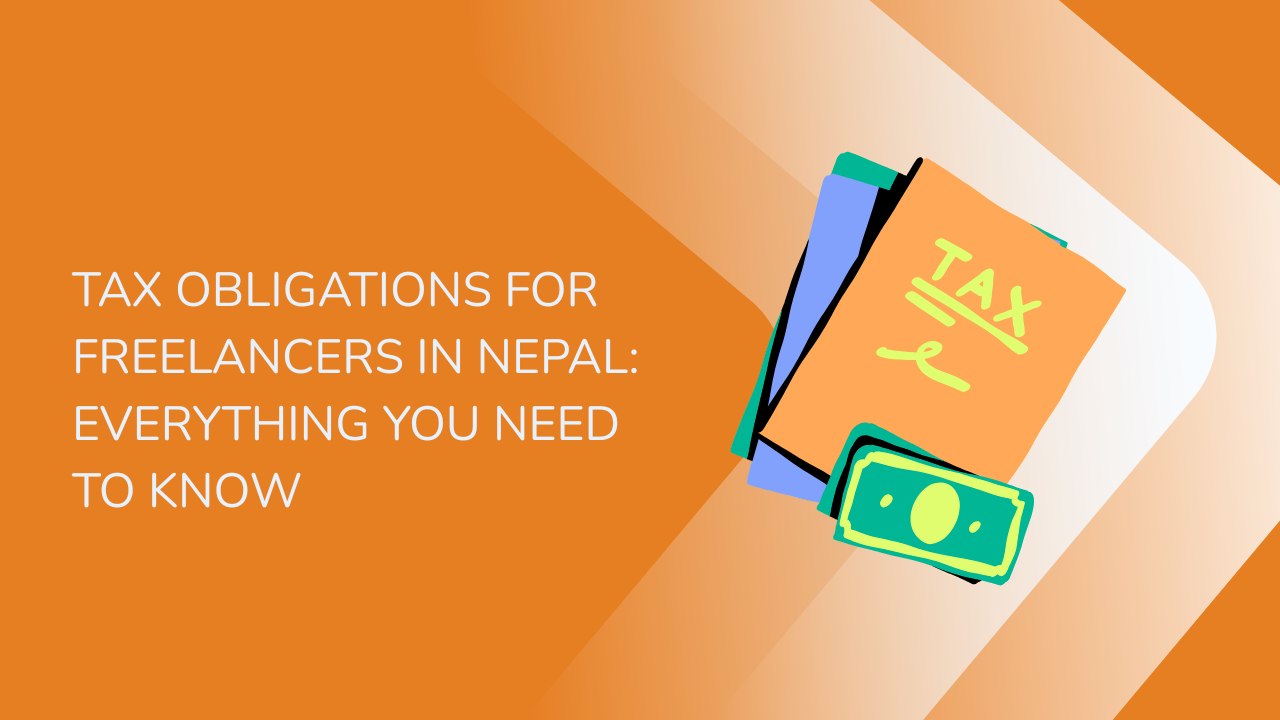Share this Article
In recent years, freelancing has become an increasingly popular choice for many professionals in Nepal. Individuals offering services such as content creation, graphic design, web development, consulting, and digital marketing are now making a living outside traditional corporate jobs. Freelancing offers numerous advantages, such as flexibility, autonomy, and the ability to work with international clients. However, this also brings new challenges, especially when it comes to understanding and managing tax obligations.
Freelancers in Nepal, just like self-employed individuals and businesses, must comply with the country’s tax laws, and ensuring that one is up to date with the tax system is critical for smooth operations. While freelancing might seem less formal than running a traditional business, there are still legal requirements that every freelancer must adhere to. This includes the proper registration, timely tax filings, and understanding what taxes apply to income generated through freelance work.
This article provides an essential guide for freelancers in Nepal to navigate their tax obligations, ensuring they are in full compliance with the country's regulations. It covers everything from Income Tax, VAT registration, and deductions to social security contributions and common tax errors to avoid.
1. Overview of Freelancing in Nepal
Freelancing has seen substantial growth in Nepal, particularly in the past decade. With the rise of the digital economy, many Nepali professionals are now offering their skills to both domestic and international clients. Whether it's software development, copywriting, graphic design, or other creative fields, freelancers are increasingly able to find work through online platforms or through direct outreach to clients.
However, freelancing does not come without its challenges. Aside from managing clients and deadlines, freelancers are responsible for handling their own financial records, including tax payments. In Nepal, the government treats freelancers as self-employed individuals, and like any other income earner, freelancers are required to report their earnings and pay taxes accordingly.
Understanding the tax structure and filing requirements for freelancers is essential to avoid legal troubles and to benefit from available tax deductions. The tax system in Nepal is progressive, meaning that the more a freelancer earns, the higher the rate of tax they pay. In this article, we will explore the tax laws, tax rates, registration requirements, and other essential topics that every freelancer needs to know.
2. Understanding the Tax System for Freelancers
In Nepal, freelancers are primarily subject to income tax regulations as outlined in the Income Tax Act. Whether you are a web designer, consultant, or content writer, if you are earning income from your freelance work, you must report and pay taxes on that income. Freelancers are categorized as self-employed individuals for tax purposes, meaning that their income is taxed just like that of a business owner or professional.
The amount of tax a freelancer must pay is based on their total taxable income, which includes all income earned through freelance activities. The country follows a progressive tax system, so the more a freelancer earns, the higher the percentage of their income will be taxed.
Income Tax for Freelancers
Freelancers are required to pay taxes on their gross income, which includes all fees or payments received for freelance services, regardless of whether they are from domestic clients or international clients. The tax system in Nepal divides income into different tax brackets, and freelancers will be taxed according to the specific rate of the bracket they fall into.
- Taxable Income: Freelancers must report their total earnings, minus any allowable deductions, to calculate their taxable income. These include revenue from services rendered and any additional income from side projects or consultancies.
- Tax Rates: The income tax rate for freelancers in Nepal varies depending on their income level. The tax rates are progressive, meaning that higher income levels are taxed at higher rates. The rates range from 1% for lower-income brackets to 36% for the highest income levels.
The tax rates for individuals are divided into various income ranges, and freelancers fall under these categories based on how much they earn annually. It is important for freelancers to familiarize themselves with the slab rates to avoid surprises when it comes time to file taxes.
3. Registration Requirements for Freelancers in Nepal
While many freelancers may not have a formal business structure, they are still required to follow the registration requirements for tax purposes. In Nepal, any individual who earns above a certain threshold from freelance work must register with the Inland Revenue Department (IRD). Registration is essential not only for complying with tax laws but also for ensuring access to various tax benefits and exemptions.
Obtaining a PAN (Permanent Account Number)
The first step for freelancers is to obtain a Permanent Account Number (PAN), which is a unique identifier issued by the IRD for tax-related purposes. Whether a freelancer is self-employed or has a formal business, they are required to have a PAN for filing income taxes.
- PAN Registration: Freelancers need to submit an application for a PAN at the IRD office or through the online registration portal. Once they are registered, they will receive a PAN card that they can use for tax filing and other financial activities.
- VAT Registration: Freelancers who have a turnover exceeding NPR 5 million annually are required to register for Value Added Tax (VAT). Freelancers with turnover below this threshold are not required to register for VAT. VAT registration requires freelancers to charge VAT on the services they provide and remit the collected VAT to the government.
The registration process for freelancers is relatively straightforward, but it is crucial to register if the income surpasses the tax threshold, as failure to do so may result in penalties and fines.
4. Filing Income Tax Returns as a Freelancer
Freelancers in Nepal are required to file an annual income tax return that reports their earnings and tax liabilities for the previous fiscal year. The tax return is an essential document that helps freelancers fulfill their legal obligations, and filing it correctly is critical to avoid fines and penalties.
Steps for Filing Income Tax Returns
The process for filing an income tax return for freelancers includes several key steps:
- Maintain Accurate Records: Freelancers must keep detailed records of all invoices, contracts, payment receipts, and business expenses. These documents will be necessary when filing taxes and calculating income and deductions.
- Calculate Taxable Income: Freelancers must subtract allowable business expenses from their total income to determine their taxable income. This may include costs like office equipment, software subscriptions, travel expenses, and other operational costs related to freelance work.
- File the Tax Return: Freelancers must file their income tax return by the deadline, which is generally mid-July of each year. The return can be filed online through the IRD’s e-filing system, or it can be submitted in person at the IRD office. The tax return will include details such as:
- Total income earned during the year.
- Deductions for allowable expenses.
- Taxable income and applicable tax rates.
- Total income earned during the year.
- Pay the Tax: After submitting the tax return, freelancers must pay any taxes owed based on the calculated tax liability. Payment can be made online or through a bank deposit into the government account.
Deadlines and Penalties
Freelancers must adhere to the deadlines set by the IRD to avoid late fees or penalties. Failing to file the tax return on time may result in fines and interest charges. It’s essential to keep track of these dates to avoid additional financial burdens.
5. Tax Deductions and Exemptions for Freelancers
One of the ways freelancers can reduce their tax liability is by taking advantage of deductions available under Nepalese tax laws. Deductions help lower the taxable income, thus reducing the total amount of tax to be paid. Some common deductions that freelancers can claim include:
Business Expenses
Freelancers can deduct various business-related expenses from their taxable income. Some of the most common deductible expenses include:
- Office rent for those working from rented spaces.
- Business-related travel expenses, such as transportation, meals, and accommodations for work-related trips.
- Equipment and supplies, such as computers, software, and office furniture.
- Marketing and advertising costs related to promoting freelance services.
By deducting these expenses from their total income, freelancers can significantly reduce the amount of income subject to taxation.
Home Office Deduction
For freelancers working from home, a portion of their home-related expenses, such as rent, electricity bills, internet costs, and phone bills, can be deducted as business expenses. The portion of the home used exclusively for work can be calculated and deducted from taxable income.
Social Security Contributions
Freelancers are also required to contribute to Nepal’s Social Security Fund (SSF), which provides benefits such as healthcare, pension, and gratuity. Contributions to the SSF are tax-deductible, which can further reduce a freelancer’s taxable income.
6. Common Tax Filing Mistakes and How to Avoid Them
Many freelancers make common mistakes when filing taxes, which can lead to penalties and complications with the tax authorities. Here are some common errors and tips for avoiding them:
- Underreporting Income: Always report all earnings, even if payments are received in cash or through foreign transactions. Underreporting income can result in significant fines.
- Failing to Keep Records: Maintain thorough records of all invoices, receipts, and business expenses. This documentation is crucial for accurately filing tax returns.
- Missing Deadlines: Keep track of filing deadlines to avoid penalties and interest on late payments.
By avoiding these mistakes and staying informed about the tax system, freelancers can ensure they remain compliant with the law and make the most of the available deductions.
7. Conclusion
Freelancers in Nepal must be proactive when it comes to understanding and managing their tax obligations. Whether you’re just starting your freelancing journey or have been working independently for years, knowing the tax rules, registration requirements, and available deductions can help you optimize your finances and stay compliant with Nepal's tax laws. By staying organized and up to date on your tax filings, you can avoid unnecessary complications and focus on growing your freelance business.







